 Wisconsin Lawyer
Wisconsin Lawyer
Vol. 80, No. 10, October 2007
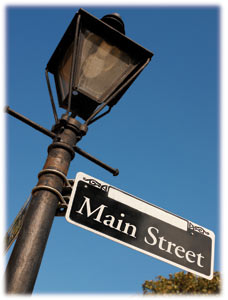
 eorge Burnett remembers an eminent Madison attorney who taught a couple of classes Burnett took while at the U.W. Law School. With a national practice, the Madison lawyer traveled regularly to meet with opposing counsel and appear in courtrooms in such cities as New York, Washington, D.C., and San Francisco.
eorge Burnett remembers an eminent Madison attorney who taught a couple of classes Burnett took while at the U.W. Law School. With a national practice, the Madison lawyer traveled regularly to meet with opposing counsel and appear in courtrooms in such cities as New York, Washington, D.C., and San Francisco.
"He had a business card," recalls Burnett, a Green Bay attorney and former State Bar president, "that introduced him as being from Maple Bluff, Wisconsin. He said it allowed people to underestimate him."
When opponents perceived him as hailing from a Mayberry-esque Midwestern town, this particular attorney felt he gained an edge. But partners in law firms in Wisconsin's small to mid-sized communities say this perception often works against them in another aspect of law practice: hiring young attorneys.
"Our experience is that it's difficult to attract top-quality candidates to Green Bay and the Fox Valley," Burnett says. On the other side of the state, Platteville attorney Mike Olds has a similar view. "Our problem is just getting people to interview," he says. "We don't have a lot of people with resumés knocking down our door."
In their job searches, recent law graduates easily can find information about large firms in Madison or Milwaukee or out of state, notes Erin Binns, assistant director of career planning at Marquette University Law School. But firms in smaller Wisconsin communities often don't have the resources to sell themselves to law graduates. "At Marquette," she says, "we recognize that we need to market the smaller firms to our students early on, so they're not thinking of these firms as a second-tier opportunity."
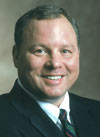 "I think too many law students are under the false impression that if you want interesting, sophisticated, challenging legal work, you have to go to a large firm in a large city. But we read the same law books up here as they do in other parts of the state. And we deal with a blend of complicated and parochial legal problems every day." - George Burnett, Green Bay
"I think too many law students are under the false impression that if you want interesting, sophisticated, challenging legal work, you have to go to a large firm in a large city. But we read the same law books up here as they do in other parts of the state. And we deal with a blend of complicated and parochial legal problems every day." - George Burnett, Green Bay
Firms in small communities near the state's more urban areas report another dilemma, notes Jane Heymann, assistant dean for career services at the U.W. Law School. Law school graduates may show interest in these firms, primarily because of their proximity to Madison or Milwaukee. "But these firms aren't looking for someone who will commute every day," Heymann says. "They want someone whose kids will attend the local schools and who will be there for meetings of the local civic organizations."
Attracting lawyers to live and work in small to mid-sized communities is one challenge; keeping them there is another. Young attorneys fresh out of law school may take jobs there and stay for only a couple of years before heading to cities like Madison, Milwaukee, or Chicago. "They leave to go to a place they see as `better,'" says Ralph Cagle, a clinical professor at the U.W. Law School. "I know of multiple instances of that."
Skewed Impressions
Burnett, a Kenosha native and U.W. Law School graduate, landed in Green Bay 24 years ago, after clerking for the 7th Circuit U.S. Court of Appeals in Chicago for a year and then practicing for two years in Milwaukee. He's never regretted leaving the bigger cities behind, he says.
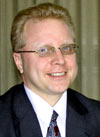 "Every town has some number of young people who left to go to law school. You never know when you might catch them when they're ready to come back." - Mike Olds, Platteville
"Every town has some number of young people who left to go to law school. You never know when you might catch them when they're ready to come back." - Mike Olds, Platteville
In fact, Green Bay has little problem retaining lawyers, according to Burnett. Attorneys tend to stay once they get there, although they may change firms. The tough part is getting them to consider Green Bay in the first place.
"I think too many law students are under the false impression that if you want interesting, sophisticated, challenging legal work, you have to go to a large firm in a large city," Burnett says. "But we read the same law books up here as they do in other parts of the state. And we deal with a blend of complicated and parochial legal problems every day."
Burnett cites three major advantages for a young lawyer practicing in a small to mid-sized community: working in a collegial legal environment, getting major responsibilities quickly, and being able to work independently. Last year his 20-lawyer firm, Liebmann, Conway, Olejniczak & Jerry S.C., hired two new associates who were recent law school graduates. "By the end of this year, I expect each will have tried at least one case," Burnett points out. "Their colleagues at bigger city firms, so I'm told, have not yet even attended a deposition."
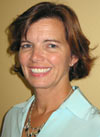 "There is nothing dull or mundane about practicing in a small town. … What we see here is what's going on with regular people. It's a wide variety. And we deal with the whole problem, not just one little piece of the problem." - Ellen Thorn, Sparta
"There is nothing dull or mundane about practicing in a small town. … What we see here is what's going on with regular people. It's a wide variety. And we deal with the whole problem, not just one little piece of the problem." - Ellen Thorn, Sparta
Having difficulty attracting top-notch law graduates from U.W. and Marquette, Burnett's firm has chosen to cast a wider net. In 2006, the firm interviewed candidates from the law schools at Northwestern University, the University of Chicago, and the University of Notre Dame. The firm hired four attorneys last year, two of whom were fairly recent law school graduates. Of those, one was a Northwestern graduate and a native of Saginaw, Mich., who wanted to practice in a smaller city like Green Bay. The other was an East Coast native and Yale Law School graduate who had migrated to Green Bay to clerk for a federal court judge and grew to like the community. The two lateral hires, who had family ties to Green Bay, were graduates from Georgetown University Law Center and Boston College Law School.
Local Connections
Looking for law graduates with ties to the community is a key recruiting strategy for Kopp, McKichan, Geyer, Skemp & Stombaugh LLP, a seven-attorney firm in Platteville, where Olds is a partner. "Every town has some number of young people who left to go to law school," he notes. "You never know when you might catch them when they're ready to come back."
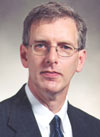 "When you interview some people, you get the feeling that it's just a practice interview for them. I don't know if some even know where La Crosse is." - Michael Stoker, La Crosse
"When you interview some people, you get the feeling that it's just a practice interview for them. I don't know if some even know where La Crosse is." - Michael Stoker, La Crosse
Olds was one of those returnees himself. After he finished the U.W. Law School 13 years ago, he took his first job in his hometown. "Like a lot of people, one reason I went to U.W.-Madison for undergrad and law school was to get away from a small community," he says. "But when you come back and you're working and have some income to be able to do some things, then that small town doesn't seem so small anymore. You start looking at the positives. This community is second to none for raising a family."
Over the years, Olds believes it has become more difficult to recruit young attorneys. The lower starting salaries in smaller communities, compared to big-city firms, are a deterrent. "But the primary problem I see is the social dynamics," Olds says. "A lot of young people are waiting longer to settle down, and they don't want to live in a smaller community."
Many people in their mid to late 20s see a small town or city as a social void. In fact, a few months ago Olds' firm lost an associate who grew up in Platteville and returned after graduating from a California law school. After three years, he decided to return to California. "I honestly think that if he'd found someone, he'd still be here," Olds observes.
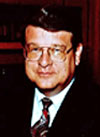 "If we're going to have a justice system, it has to be in all 72 counties."Mike Eckert, Rhinelander
"If we're going to have a justice system, it has to be in all 72 counties."Mike Eckert, Rhinelander
Another recruiting hurdle, Olds says, is the belief that it's impossible to develop a practice focus in a smaller community. He refutes that and cites his own firm as an example. The firm offers a wide range of legal services. "So in that sense we are a general-practice firm," Olds says. "But our attorneys focus in different areas. When we hire, we look for someone who wants to develop a niche."
The Right Fit
Counter to what some people assume, "there is nothing dull or mundane about practicing in a small town," says Sparta attorney Ellen Thorn. "I think it's the opposite. What we see here is what's going on with regular people. It's a wide variety. And we deal with the whole problem, not just one little piece of the problem." She also notes that two of her partners presented oral arguments before the Wisconsin Supreme Court within the past year.
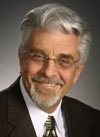 "A lot of baby boomers out there are getting close to retirement age. They face the question of what's next. Are they going to have to close their doors?" - Ralph Cagle, clinical professor, U.W. Law School
"A lot of baby boomers out there are getting close to retirement age. They face the question of what's next. Are they going to have to close their doors?" - Ralph Cagle, clinical professor, U.W. Law School
Thorn always knew a small-town practice was right for her. Growing up as a veterinarian's daughter in Palmyra, Wis., she'd witnessed the life of a small-town professional. "You work with a lot of people in your community," Thorn says. After finishing the U.W. Law School in 1984, she worked in a Madison firm for a year, then spent six years in La Crosse as a public defender before opening Arndt, Buswell & Thorn S.C. in Sparta with two partners in 1991. They now have three associates.
While Thorn is sold on being a small-town lawyer, she acknowledges that small-town firms face major recruiting and retention challenges. "We'll look at three qualified candidates," she notes, "and think, `Who is the one most likely to want to be here in five or six years?' It is a guessing game."
Difficulty hiring and retaining young attorneys in small communities has repercussions beyond local law firms, Thorn points out. As lawyers retire and age, "You look at some counties," she says, "and you wonder who's going to run for judge?"
Continued accessibility to legal services is another issue. As attorneys in small communities retire, and no new lawyers come in to take their place, residents may have to drive many miles to see an attorney. That's not the same as seeking help from a lawyer you know from your local church or Rotary. The community loses in other ways, too, Thorn adds.
"I can't imagine someone calling up a lawyer in the next county," she says, "and asking, `Can you spend two hours next Thursday morning at Sparta High School?' If you're a lawyer in the community, you're available for various kinds of educational and public service activities."
Looking for Young Lions
Many law firm partners from smaller communities perhaps can relate to an experience La Crosse attorney Michael Stoker has had when visiting law schools to recruit associates. "When you interview some people," he says, "you get the feeling that it's just a practice interview for them. I don't know if some even know where La Crosse is."
From that point, it's a huge step to get a young lawyer to think of La Crosse as an appealing place to live and work … and stay. The community has much more to offer than many people realize, Stoker says. "I've walked from my office over to our convention center to listen to Bob Dylan and Paul Simon," he says. "It's not like we're in the middle of nowhere." He also likes the fact that his home-to-office commute is a mere mile.
Years ago, issues such as commuting and raising a family were what spurred Stoker to reject job offers from large Chicago firms. He'd spent part of his growing-up years in the La Crosse area and migrated back there after finishing the U.W. Law School in 1989. He took a job at Johns, Flaherty & Collins S.C., where he still practices today with 13 attorney colleagues.
But getting young lawyers to give La Crosse a serious look is difficult. "Sometimes we interview," Stoker says, "and we just don't find anyone." He cites several issues: lower pay than in the big cities, fewer professional opportunities for spouses, and the need to have a broader practice view. "In this area, we don't have a lot of boutique firms and `specialty' attorneys," Stoker says.
But the biggest challenge is finding lawyers who want to live in a smaller community. Somewhat older attorneys who are ready to settle down might seem to be better prospects. "But when you do that, you're still moving up the age range," Stoker points out. "A number of firms in town are basically aging institutions. You need to have those young lions. You need to find young people who will come in, start building relationships, and do good things for the community."
Staying Put
Rhinelander attorney Mike Eckert lists several common misconceptions about practicing law in a small community: You can't have a challenging practice. You can't make a decent living. There are no opportunities for personal or professional development. His response to all three counts: "Not true." Plus, there are those small-town amenities. "If I want to go fishing when I get home," he says, "it's a two-minute walk from my house down to the dock. It's not a major endeavor here to recreate."
Eckert, originally from Eau Claire, has practiced in Rhinelander since 1975, when he took a job, right out of U.W. Law School, with a local firm. Ten years later he opened a private practice, Eckert, Kost & Vocke LLP, which today has three partners and two associates. A third associate, Mike Bloom, left a few months ago after Gov. Doyle appointed him to be district attorney. The firm currently is searching for an experienced associate. Eckert says recruiting has gotten tougher over the years. "When we run ads," he says, "I don't see as many resumés crossing my desk."
Keeping his firm alive - and others like it in small communities across Wisconsin - is critical, Eckert contends. "If we're going to have a justice system," he says, "it has to be in all 72 counties."
Plus, small communities lose more than law practices when they lose their lawyers. Rhinelander attorneys, for instance, are extremely active in the community. Just one of their many activities is coaching the high school's acclaimed mock trial team, which has won multiple state championships and once beat Los Angeles for the national title. "It's one heck of a program," Eckert says, "due to the dedication of a lot of local lawyers who put in a lot of Sundays and evenings with the team."
Whatever recruiting and retention problems there may be, Eckert is among those lawyers in small to mid-sized communities who are determined to keep their firms going. A couple of years ago, Eckert and one of his partners invested in a new building, which has room for three more attorneys plus their support staff. "We intend to grow our firm," he says. "This firm is not going to go away."L
Wisconsin Lawyer
